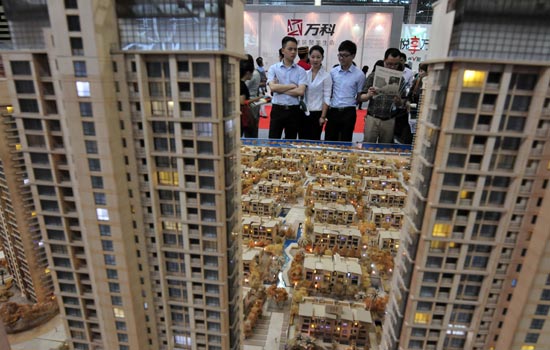 |
|
Potential buyers examine housing models of China Vanke, the country's largest residential real estate developer, at a property fair in Fuzhou, capital of Fujian province, last month. Many developers saw their turnover grow more than 20 percent in May, thanks to a warming market after a year-long chill.[Photo/China Daily] |
Yearly sales increases seen across nation as pent-up demand released
Property markets across China are showing signs of a definite thaw, as pent-up demand is fanned by widespread speculation about further easing in the government's monetary policy aimed at fuelling the economy, according to an influential snapshot of the sector.
In its latest report, China Index Academy, or CIA, said that 35 major cities reported year-on-year sales increases, with Lanzhou, capital of Gansu province, hitting a massive 560.25 percent year-on-year increase between June 17 and 24.
Headquartered in Beijing, CIA is one of the country's largest property research institutions, providing extensive coverage of property markets through a network of offices in major cities.
The latest report showed that as many as 57,000 apartments in 54 major cities were sold between June 17 and 24 - a weekly record that exceeded 50,000 traded units since 2011, according to statistics provided by Centaline Property Agency Ltd.
The turnover in May of four leading Chinese real estate developers exceeded 10 billion yuan ($1.57 billion), according to their latest financial reports, suggesting a warming market after a year-long chill.
The four companies are Poly Real Estate Group Co Ltd, China Vanke Co Ltd, Evergrande Real Estate Group Ltd and China Overseas Holdings Ltd.
The top seller Poly's sales in May grew 45 percent over a year earlier to hit 10.77 billion yuan, slightly higher than that of China Vanke. It was the first month in 2012 that Poly had revenues of more than 10 billion yuan.
The combined turnover in May for the top 15 of China's property developers reached 268.6 billion yuan. For many companies, the turnover grew more than 20 percent last month.
A survey released by the People's Bank of China on June 19 showed that among 20,000 respondents in 50 cities across the nation, 29.4 percent said they could afford homes at their current price level.
About 15 percent said they intended to buy a property in the coming three months, the highest rate since 2011 when the central government announced it was placing controls over housing prices while looking for ways to boost the economy.
About 20 percent of respondents said they expected that housing prices will increase, according to the People's Bank survey.
Local governments across China have been trying to adjust house sales policies to help kick-start the economy, said Xue Jianxiong, analyst with China Real Estate Information Corp, or CRIC, a realty information provider.
Xue added that discounts introduced by developers in the past months have attracted buyers; the number of available apartments have decreased, while demand grew, with the average price rising as a result, in many of the popular projects.
As well as developers, local governments are also trying to increase sales.
The central government has approved more than 80 percent of new house purchase policies proposed in 33 cities since August 2011, Securities Times reported last month.
However, some policies aimed at loosening purchase controls proposed by some local governments, including those of Foshan, Wuhu, Shanghai, Chongqing and Chengdu, have been suspended or canceled after being found to conflict with the central government's plans to curb price increases, the report said.
One example was a policy proposed last week in Henan province, which offered a 30 percent discount on interest rates for first-time homebuyers.
But two days after being offered, Henan authorities withdrew it, due to what it called conflicts with central government controls.
Despite central government efforts at curbing price increases, in many cities, including Beijing, Guangzhou and Shanghai, the prices of newly developed apartments have still been climbing since April, according to the latest sales records by local housing authorities.
The average price of some new properties, especially high-end ones, have seen up to 20 percent annual price increases in Shanghai, according to the latest report by CRIC.
Chen Qiguang, a 32-year-old potential buyer in the city, said: "I've visited more than 10 projects in the past two weeks, and have found average prices of new projects have been significantly higher than in early March, and second-hand properties are in short supply because owners do not want to sell at a low price."
Average Shanghai housing prices for newly developed properties in the first 17 days of June hit 23,141 yuan ($3,640) per square meter, their highest level for 18 months.
Among the 56 new properties monitored by CRIC in Shanghai, 30 were reported as rising in price, while 26 were sold for a lower price, the CRIC report said.
"Some buyers are worried that house prices might further increase so they bought homes during the past two months, which helped push up prices since April," said Zhang Yulin, an account manager at Xinyuan Property Agency in Shanghai.
Some popular housing projects have suspended discounts amid the bullish market, which also added to average prices, added Zhang.
Li Wenjiang, chief analyst of the Hong Kong-listed property agent Hopefluent Group Holdings, reported solid demand from buyers in Guangzhou, as a result of improving conditions being offered.
The market there remains especially good for buyers looking to upscale, with more large units set to be launched, lifting overall prices, said Li.
But he ruled out any fast growth in the market in the immediate future, given the economic conditions and controls by the government.
The traditionally dull months of June-August would also curb any rebound, added Li.
Contact the writers at [email protected] and [email protected]
Zheng Yangpeng contributed to this story
